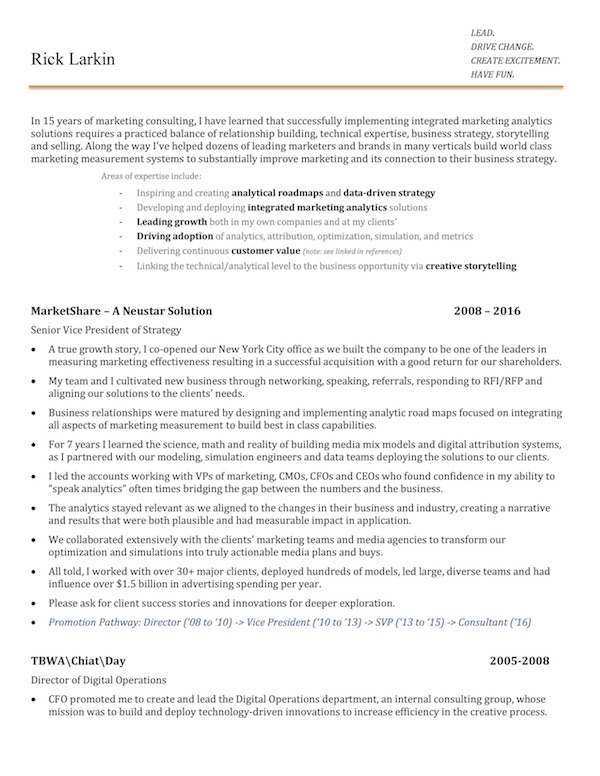This guest post by Erica Seidel is part of a regular column she writes, Ask the Martech Recruiter. Erica runs The Connective Good, a retained executive recruiting firm that helps companies land leaders in martech, marketing, digital strategy, analytics, and market research.
Dear Erica,
I am interviewing for a martech job this week and I really want it! But the competition is stiff. How can I make myself more memorable in the interview?
Thanks,
Carla, Seattle
Dear Carla,
Great question! In order to get the job, you first have to stick in the interviewers’ heads. And not everyone can do that.
I’ve interviewed thousands of people. And a small handful of those people have stuck in my mind way more than others.
Here’s my breakdown of:
- what these people do to make them memorable
- how you can crack the code
| WHAT MEMORABLE CANDIDATES DO | HOW YOU CAN CRACK THE CODE |
|---|---|
| They can very clearly spell out how they are distinct, and why that matters.
For instance, consider the difference between: “I’m really great at data integrations.” and: “You can probably find a boatload of marketing technologists that can SELECT new technologies. After all, many martech folks enjoy the opportunity to build a martech stack from the ground up. But where things really get hairy is when you need to INTEGRATE data sources and technologies. It’s not necessarily glamorous work, but if you can do it, you can unlock real value for the company. It’s rarer to find someone who has done that and done that well. I am the person who will not only select and implement, but also integrate.” |
Repeat to yourself: “Context is king.”
You may have to bend over backwards to put your work into context, especially for people who are not martech experts. |
| They share a bit about themselves personally.
There was the candidate who said, “I grew up on a farm and it was a big optimization challenge every season, to figure out how to most efficiently harvest the wheat and the soybeans and the corn.” That search was for a company that had a hard-working culture and needed someone to optimize and scale its operations. That candidate got the job. Then there was the candidate — someone I recently placed in a VP role — who mentioned this in passing: “If I was in a band, I wouldn’t be the lead singer. I’d probably be the bassist. I don’t always need to have the spotlight on me or get all the credit.” Well, hot diggity, I was looking for someone to join a low-ego culture and build marketing from the ground up, which can be messy. He got the job. At the best, knowing more about who a candidate is personally can help me make a better match. At the least, it’s a relationship accelerant — we’re building a foundation for deeper conversations later on. |
Map out a timeline of your life.
We’re not just talking about your career here. wW’re talking about your life. What were the peak experiences? What has made you into you? Try peppering a couple of personal details into your conversations. There’s no need to share stuff that’s too personal. But a bit of vulnerability will make people like you, feel like they know you, and want to respond in kind. You may find it useful to try out your “personalization” approach with your friends. |
| They punch up their language with vivid language and analogies.
Which of the following two statements makes you sit up and pay more attention? “The martech stack was out of date when I started.” …versus… “When I started, the organization was crippled with a martech stack that hadn’t kept up with growth of 50% annually.” How about these? “I researched and shared the best tools for martech and analytics.” …versus… “I took the organization on a journey of discovery of all things marketing, tech, and analytics.” |
Pay attention to the vivid language and metaphors that others use. Steal shamelessly! |
| They bring a portfolio of work to share.
We all take in information differently. Some of us need to see things. Some need to hear them. Some need to physically interact with things. A typical phone interview is slanted in favor of people who take in information through hearing. With a portfolio, you can engage more of the senses, while grounding the conversation in specifics of your work. Note that this can backfire if the person goes on and an about something that is not relevant to the job, or if the bulk of the work in the portfolio is not on point for the job we are discussing. |
Show some recent work samples.
Or ask something like, “Would you like the three-minute guided tour of the website I was involved in launching? That will put our conversation into context.” See also: interviewing for a martech role when the interviewer doesn’t understand martech. |
| They provide social proof.
They don’t just say, “I’m a great manager of people.” Instead, they’ll say, “When we recently did 360-degree reviews, four of the five people on my team said I was the best manager they have had, because of how transparent I am.” By invoking others like this, they become more believable with data, and they show they can share the spotlight. |
Increase your legitimacy by bringing in data points from others — even before you’re asked to provide references. |
| They end up selling me on the job or the company that I am pitching to them.
They are showing that they listen well, can quickly understand the business and the value it provides, and are excited about the opportunity. They often have a fresh spin on the pitch. |
If you’re excited about the job, show it, and say why. |
| They anticipate the objections the hiring team will have.
The most successful interviewers can predict what concerns I will have, and head them off. They also ask me at the end of our interview, “So how do I match up to what you are looking for?” This often leads to the most candid part of the conversation. And it’s an opportunity for them to clarify or revise initial impressions. |
Ask confidently about how well you match the spec, and whether there are any concerns. |
| They know what they want and where they can add value, and it shows. They don’t beat about the bush. | Clarify your positioning before the interview. This is not the time to treat the recruiter or the hiring manager as a therapist. |
| They avoid the sin of droning on and on. | Call your voicemail and practice answering an interview question. Then play it back. If it is too long, trim it. Look for opportunities to interrupt yourself with questions that generate a conversation with your interviewer. If it sounds boring, work on inflecting your voice. |
In short:
- Be interesting and interested
- Go for clarity in thought and word
- Practice
- Show, don’t just tell
What other tips for being memorable do you have to share? Please comment below.
Have a question on recruiting or career transitions to propose for this column? Please email erica@theconnectivegood.com. Don’t worry, we’ll keep your name and company confidential.
Readers: Erica is on the board of advisors of the MarTech conference. She will be leading an executive session at our upcoming event San Francisco, May 9-11, with a panel of CMOs: How Chief Marketers From Visa, Belkin, and Oracle Are Transforming Their Teams and Talent. Register today for the lowest “alpha” rate on tickets to guarantee your seat.



